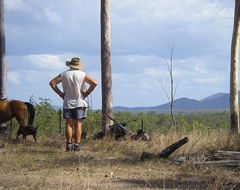
A little stress can keep you on your toes, keep motivation levels high, and help you get things done, but persistent high-level stress reduces productivity, impairs decision making and is probably doing you damage. Stress is also a contributing factor to many farm injuries.
Farm life is busy and often stressful. Stress can be caused by everyday issues like farm finances, machinery breakdowns, family and relationship pressures, workforce shortages, or managing livestock. Extreme events like bushfires, droughts and floods can be particularly stressful.
Stress can affect many areas of the body including the nervous system, memory, the ability to fight off infection, cardiovascular health, pain and gut problems. Everyone reacts differently to potentially stressful situations. This can depend on your personality, the extent of your support network or other things that are going on in your life.
Learning to recognise your stress triggers is an important step in developing your coping skills. The Farmer Health ‘Steering Straight’ plan can help you achieve this.
Try to:
- Think about your thinking: Consciously focus on identifying and halting unhelpful patterns of thinking (e.g. ‘I will never get this job done’) and replace this with helpful thinking patterns (e.g. ‘This job might take me a while, but if I break it into chunks and get someone to give me a hand, I can get it done’).
- Talk positively to yourself: Instead of getting annoyed and irritable when things go wrong, tell yourself you won’t let this get to you. Try it, it works.
- Talk to your friends: Chances are you’re not the only one who feels the way you do, and talking may help you find solutions you hadn’t thought of on your own.
- Talk to a professional: If you feel you need a hand, talk to an expert (for farm tasks as well as your own personal wellbeing). If there are not many services in your area, or you’d prefer something more private, there are confidential phone lines and online services you can use to support your social and emotional wellbeing.
- Talk to your pet: They are always pleased to see you and great listeners! While pets may not have the answers, often the process of talking about a challenge can help identify solutions.
- Write a list: Sometimes thinking of all the jobs you need to do can seem overwhelming. Writing a list and prioritising tasks can increase your sense of control. Make sure you tick off items and reward yourself as you achieve them!
- Don’t avoid making decisions: Stress can lead to poor decision making or—worse still—failure to make any decisions. Seek information and make decisions early to ensure you have options in difficult times.
- You need to look after yourself, it’s a critical element of looking after your farming business.
Some key things to reduce stress and improve your health include:
- Get adequate sleep
- Eat healthy meals
- Take time to do something you enjoy
- Take time away from the farm
- Remain involved in your community
- Find things to laugh about
These are the things that we often neglect when life gets stressful, but are also some of the simplest and most effective strategies to help us get through tough times.
Fast facts:
- Farming life and work can be hectic and stressful.
- Long-term stress can damage your health, personal life and contribute to farm accidents. Stress needs to be recognised, understood and managed.
- Understand your stress triggers and develop your coping skills (this needs practice).
- Maintain a healthy lifestyle, find things that make you happy, rest, relax and take a few breaths before you respond to a stressful situation
References used for this topic
More information:
National Centre for Farmer Health
Managing Stress on the Farm
Beyond Blue
Stress and Mental Health
Black Dog Institute
Hints to avoid harmful stress
Black Dog Institute
Happiness
Reach Out
Coping with the Drought
Research & reviews:
Australian Journal of Rural Health
Why are some drought-affected farmers less stressed than others? The association between stress, psychological distress, acceptance, behavioural disengagement and neuroticism
Rural Society Journal
Enduring Drought Then Coping With Climate Change: Lived Experience and Local Resolve in Rural Mental Health
The American Institute of Stress
Stress and heart disease
Journal of Rural Health
Alcohol consumption, obesity, and psychological distress in farming communities-an Australian study
The Medical Journal of Australia
Drought-related stress among farmers: findings from the Australian Rural Mental Health Study
|
|